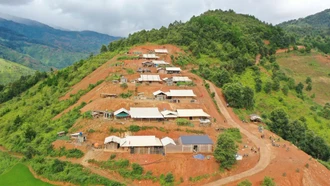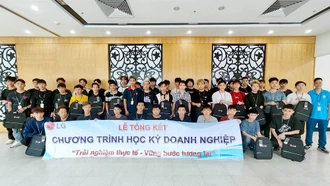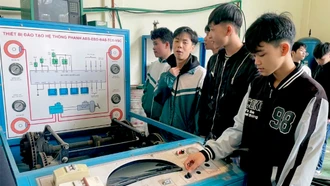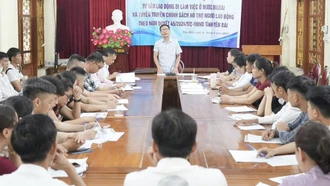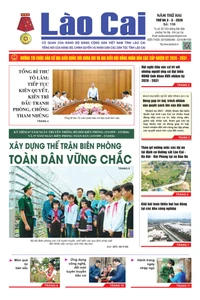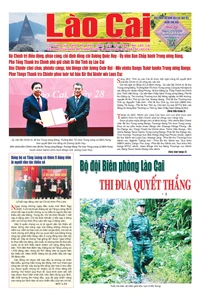Recognized Contributions
According to statistics, the province currently has over 3,550 active enterprises, most of which are SMEs. Despite the challenges posed by mountainous terrain, underdeveloped infrastructure, and limited markets, the presence and resilience of SMEs demonstrate strong internal economic strength in the province.
Beyond their economic contributions, these enterprises have created tens of thousands of jobs, spurred urbanization, and played a key role in realizing the province’s economic restructuring goals by increasing the share of industry and services.
Yen Bai's socio-economic report for the first quarter of 2025 shows a GRDP growth rate of 9.58%, ranking 12th nationwide and 5th among 14 provinces in the northern midland and mountainous region. These impressive figures owe much to the SME community—businesses that have persevered, adapted flexibly, and acted as a "dual engine†driving growth.
However, SMEs still face numerous challenges, such as limited access to credit, restricted production space, low-quality human resources, outdated technology, and limited market expansion capacity. In this context, the Government’s issuance of Directive No. 10 on March 25, 2025, to promote SME development is a timely and strategic decision.
"Institutional Leverage"
With the spirit of "action matched with words,†Yen Bai Province has swiftly issued a concrete action plan and implemented comprehensive solutions across the political system, viewing this effort as "institutional leverage†to improve the investment and business environment and foster new development drivers for the province.
Immediately following the issuance of Directive No. 10, the provincial People's Committee formulated Plan No. 75 on April 10, 2025, aiming to have at least 5,000 efficient enterprises by 2030. To realize this goal, the province is shifting its approach—from a "request–approval†model to one of "service–accompaniment,†and from "management†to "facilitation.†This shift is clearly reflected in the overarching "6 clarity†principle: clarity in people, tasks, responsibilities, authority, timelines, and outcomes—a declaration of institutional reform tied to specific political responsibilities at every administrative level and for every official.
The plan focuses on administrative reform and maximizing convenience for citizens and businesses. The province aims to reduce administrative processing time by at least 30%, cut compliance costs by a minimum of 30%, and eliminate unnecessary business conditions. Transitioning from "pre-inspection†to "post-inspection†represents a major shift in thinking—demonstrating the government’s trust in enterprises, respect for their autonomy, and encouragement of dynamism and creativity in the private sector.
Local authorities are expected to treat the difficulties of businesses as their own. The province has organized multiple dialogue forums, with initiatives like "Entrepreneur Coffee Meetings†and "Weekends with the People and Businesses†becoming regular interaction platforms to resolve issues and build strong trust between government and business communities. These are not merely administrative acts but political commitments—affirming the government’s role as a service provider.
Practical Action
Alongside administrative reform, infrastructure development is regarded as a strategic task to enhance the province’s overall competitiveness. In 2025, Yen Bai aims to disburse over 95% of its public investment capital, prioritizing transportation projects, regional connectivity, industrial park infrastructure, and logistics—foundational elements to attract investment, particularly from large enterprises, thereby creating a ripple effect that "leads and activates" SME development under the model of "growing together."
Beyond the improvement of existing infrastructure, Yen Bai has proactively proposed a development strategy for emerging industries such as semiconductors, electronic chips, and digital technology—opening up a new economic space, stimulating private investment, and offering opportunities for SMEs to join global supply chains. This bold direction reflects the province leadership’s forward-thinking and creative mindset in building a "next-generation business ecosystem" geared toward high-added-value, sustainability, and environmental friendliness.
One of the chronic bottlenecks for SMEs is the lack of capital. To clear this credit flow, Yen Bai has directed the State Bank Branch Region 4 to lead financial access support programs, focusing credit on production, export, digital transformation, innovation, and green economy. Credit institutions are encouraged to reduce costs and promote lending based on assets formed in the future—an effective solution for startups or enterprises without traditional collateral.
Specifically, as of April 30, 2025, outstanding loans for agriculture and rural development under Government Decrees No. 55 and No. 116 reached over VND 22,870 billion, an increase of 7.4%; by May 31, 2025, this figure is expected to reach VND 22,950 billion, up 7.8%, accounting for over 44% of total outstanding loans. Loans for the export sector as of April 30, 2025, reached VND 954 billion, up more than 36%, accounting for 1.9% of total outstanding loans; by May 31, 2025, it is estimated to reach VND 965 billion, an increase of 37.7%.
In parallel, Yen Bai is focusing on training human resources in accordance with business needs. Cooperative training–recruitment–employment models such as "Training by Order" and "Job Fairs" are creating a solid foundation for long-term development. Additionally, the province is promoting digital transformation, e-commerce, brand development, and trade promotion to help businesses expand markets and integrate more deeply into global value chains.
A highlight of Yen Bai’s enterprise support strategy is the increasingly substantive role of the Provincial Business Association. Evolving from a "representative of members," the Association is now also entrusted with policy advocacy, legal enforcement monitoring, organizing training programs, fostering business culture, and promoting international integration.
Authorities expect the Association to not only serve as a "message carrier†but also as a hub connecting the business community and nurturing a generation of entrepreneurs with courage, capability, and a spirit of innovation. This effort will further strengthen the internal capacity of the private economic sector, contributing significantly to the realization of the province’s comprehensive and sustainable development goals.
The implementation plan for Directive 10 sends a strong message from Yen Bai’s government: enterprises are at the center and are the driving force for development. With a long-term vision, a resolute spirit of action, and comprehensive solutions, this plan will serve as a "lever" for SMEs to make a breakthrough in the near future. Only by creating a truly favorable, transparent, and effective investment and business environment can SMEs become the pioneering force in realizing Yen Bai’s development aspirations—fast, sustainable, and inclusive growth.
Hong Duyen

















